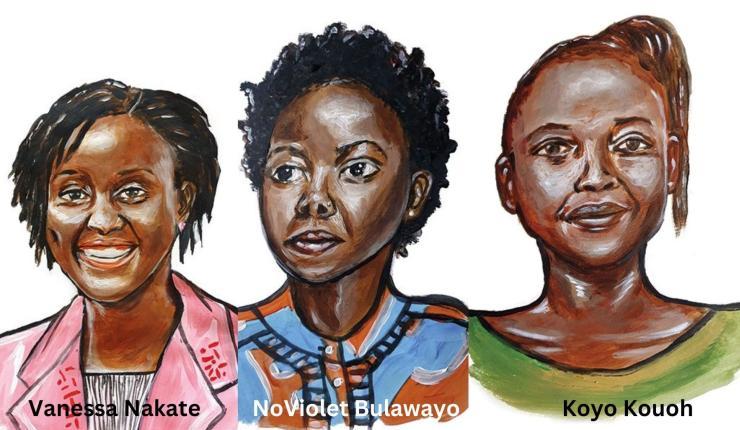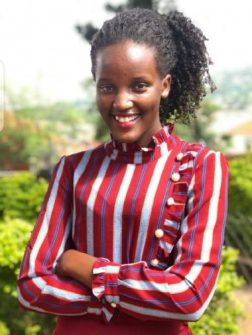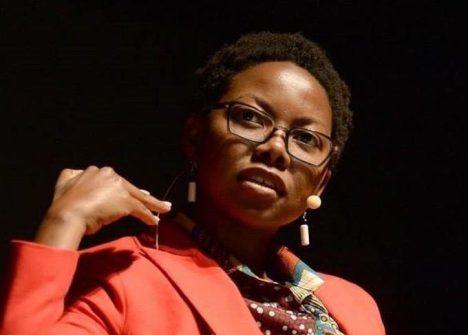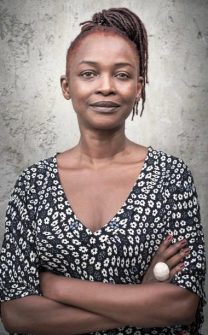Africa. To make a difference.

A climate activist, a cultural producer and a writer. Three African women with a proposal: Redefining the African narrative.
Vanessa Nakate is much more than an African Greta Thunberg because the reality of the continent is more complex than that of Europe when reflecting on the effects of climate change. But the Swedish activist inspired her to take action when, in 2018, temperatures began to rise in Kampala (Uganda) and she decided to go on hunger strike in front of Parliament to criticize the inadequacies of African governments regarding the climate.
Although she has not yet turned thirty, Vanessa Nakate is already a point of reference in international forums. She founded the Youth for Africa’s Future and the Rise Up Movement, is the spokesperson for the Fridays for Future (founded by Thunberg), and participated in the latest United Nations conferences on climate change, where she protested because the most polluting countries on the planet, led by The United States, do not keep their economic promises to those who suffer the most: only 4% of global pollution is attributed to the African continent.

Vanessa Nakate. “No voice is too small to make a difference” CC BY-SA 4.0/ Paul Wamala Ssegujja
“My country relies heavily on agriculture, most people living in villages and rural communities struggle to get food due to high prices. Lack of rain means hunger and death for the less privileged,” she said in an interview.
Based on the evidence, Nakate insists on how climate change will expose 118 million of the poorest Africans to drought, floods, and extreme heat by 2030. The young Ugandan activist is part of a network of local activists who demand action that cannot wait. “Instead of asking how far climate activism has to go, we need to ask how far environmental destruction has to go before our leaders wake up and do what is necessary to combat the problem,” she declared to Future Planet last year.In 2021 she published the book A Bigger Picture: My Fight to Bring a New African Voice to the Climate Crisis, which encapsulates what she has learned from her years of activism: the certainty of increasing poverty and inequality generated by climate change, as in the case of the Congo River rainforest, which by the year 2100 could lose thousands of plant and animal species on which 70 million people depend. At the World Economic Forum in Davos in 2020, she denounced racist treatment by the media when she was cut out of a photograph in which she appeared with other young climate activists.
UNICEF Goodwill Ambassador since 2022 and recognized in 2021 by Time magazine as one of the 100 global leaders, Nakate has managed in five years, through her Vash Green Schools project, to operationalize 39 solar panel installations in Ugandan schools. “I am a terribly shy person, but I found the strength and courage to make a banner and stand before Parliament in 2019. No voice is too small to make a difference and no action is too small to transform the world,” she declared in a forum after recalling that her activist friend Evelyn always says that “we can’t eat coal and drink oil, and money will be useless on a dead planet.”
NoViolet Bulawayo. Writer
Elizabeth Zandile Tshele was born in Tsholotsho Department, Zimbabwe, on 12 October 1981. Known in the literary world as NoViolet Bulawayo – the name recalls her mother, who died when she was just 18 months old, and the town where she grew up, the second largest in Zimbabwe, after Harare. Her literary career has been brief, with only two books published, We Need New Names (2013) and Gloria (2022), She was known from the start for her ability to describe, explain and recreate the difficulties, suffering, joys and sorrows of a country that was transformed, in a few years, from a British colony to a promising independent nation – at the hands of a then enthusiastic Robert Mugabe – only to fall into a state in which repression – with Operation Gurkurahundi, led by the army, in which almost 20,000 citizens considered dangerous to the regime were eliminated, poverty, hyperinflation or attrition led to the disillusionment and emigration of a large part of the population.
These themes, permanent in Bulawayo’s literature, are also a way to position herself in the face of the reality of her native country: “The criticism is totally intentional. In the times we live in, I believe that not being an activist is not an option. Above all, if we tell the stories of vulnerable people”, she said recently in an interview, in the presentation of her book: We Need New Names.

NoViolet Bulawayo. “I believe that not being an activist is not an option” CC BY-SA 4.0/ EuphoricOrca
In this novel, the condemnation was disguised, among other tricks, as simple children’s entertainment. Bastardo, Sabediós, Chipo, Stina or Darling, some of its protagonists, played at being countries, and the winners chose the United States, Switzerland or Canada – destinations of much of the emigration from the southern nation – as a reward for the victory, while the losers embodied South Africa, Botswana or Tanzania. In real life, those who remained in post-colonial Zimbabwe suffered from an increasingly despotic Mugabe, while those who left, like Bulawayo herself – who left at 18 for the United States to complete her academic education and start his literary career – found themselves in a context far from the ideals, the myths and dreams they had before embarking on the migratory project.
This pioneering work placed her on the shortlist for the 2013 Man Booker Prize, making her to be considered the first black African capable of winning the prize. She received due recognition when she was awarded the Caine Prize (2011) for her story Hitting Budapest, the Etisalat Prize and the Hemingway Foundation Award.
In addition to lecturing at Cornwell University, between 2014 and 2018 she was part of the pan-African literary initiative Writivism. Four years after leaving that project, she returned to the fray with Gloria, a work in which many analysts see parallels with Orwell’s Animal Farm. Bulawayo uses satire to denounce a power – that of the late Mugabe and that held by the current president, Emmerson Mnangagwa – for which the author is not a comfortable figure. “I know the government is not passionate about my work, but I’m not worried.” And she adds: “If I remain silent, I will in no way help resolve this situation.”
Koyo Kouoh. Cultural Producer
She lived until the age of 13 in her native Cameroon, then emigrated with her family to Zurich, Switzerland, where she studied economics. In 1995 she went to Dakar (Senegal) to interview the director Ousmane Sembène and discovered that she wanted to dedicate herself to culture. She started with literature and cinema, then with photography, and in 2008 she launched the RAW Material Company project – an art centre, exhibition hall, artist residency and debate space – in Dakar.
In 2019 she arrived in South Africa. After 20 years of participating in biennials and curating cultural projects, it is now the Zeitz Museum of Contemporary Arts Africa, known as Zeitz MOCAA, in Cape Town, where Kouoh is investing all her talents as CEO and Chief Curator.
Upon taking on the role, she recalled that her obsessions as a curator, “women, politics, artists creating universes, diaspora, the idea of modernity and, of course, the digestion of colonialism with an emphasis on South Africa”, would have been at the centre of his choices. In fact, she has not stopped fighting to ensure that the representation of Africa is far from the usual negative and pejorative connotations. “I’m interested in the stories and paradigms we offer about ourselves,” she told the New York Times in August, referring to artists from the continent and the diaspora who represent an “expansive culture.”

Koyo Kouoh. “Proud of the beauty of African culture”. Photo: University of Pittsburgh
The MOCAA was opened in 2017. Shortly thereafter, its first director, Mark Coetzee, resigned. Nigerian curator Azu Nwagbogu served as interim director until Koyo’s vitality came like a whirlwind to resolve the almost total lack of a work system, employees, funds… Then came the pandemic and the museum was closed for seven months. “There was an urgency to come back to life,” Koyo said, convinced she would succeed. To ensure that an average of 2,000 people visited MOCAA every day since the beginning of her mandate, she postponed the exhibition of works by prominent authors such as Tracey Rose or Otobong Nkanga and began with an open call to any artist, amateur or professional, from Cape Town who would like to share their work. “Many South Africans have a psychological barrier to these art spaces, but our proposal brought them here, they came to see their works in the museum.” She then opened the space to artist residencies, discussions and meetings and created a global board of advisors for MOCAA. Her personal, social and educational experience in Africa and Europe allowed her to make the decision to return to the African continent when she had her first child as a single mother. “I couldn’t stay in Europe, in that saturated space. I had become a mother and I couldn’t imagine raising a black child there,” she explained about a decisive moment in her life. She then adopted three more children.
She declares herself a “conscious addict” of shoes, clothes and food, although what obsesses her is showing that on the African continent, there is enormous “mutual support, generosity and care”. She is part of a professional generation that declares itself “proud of the beauty of African culture”. (Illustration: Tina Ramos Ekongo) – Carla Fibla Garcia-Sale & Javier Farinas Martin)



